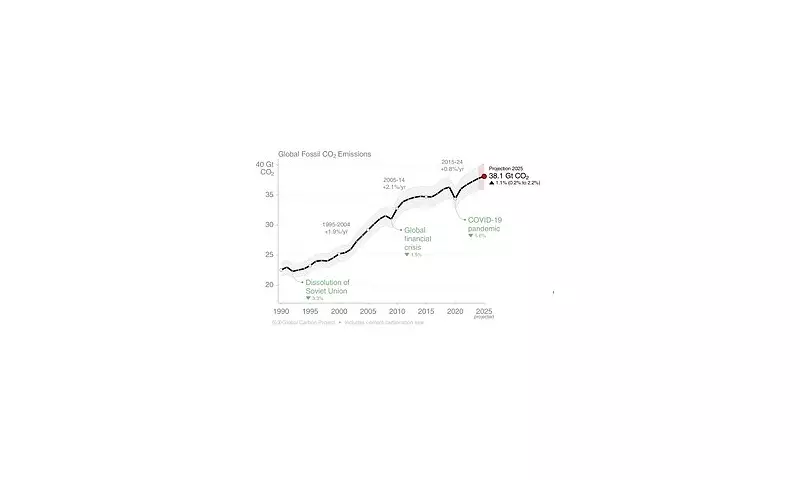
Record Carbon Emissions Threaten Climate Targets
Global carbon dioxide emissions from burning fossil fuels are projected to reach their highest level on record in 2025, according to a sobering new report from the Global Carbon Budget. The comprehensive study reveals that emissions are set to increase by 1.1% this year, reaching a staggering 38.1 billion tonnes of CO2.
The findings, based on preliminary data and sophisticated computer modelling, paint a concerning picture of the world's progress in combating climate change. If these projections prove accurate, 2025 will mark a new record high for carbon emissions, pushing the planet further from crucial climate targets.
Mixed Progress Across Nations
While the overall global picture appears bleak, the report highlights some encouraging developments. The United Kingdom stands among 35 countries that have successfully reduced their fossil fuel emissions while simultaneously growing their economic output. This demonstrates that economic growth and emission reductions can occur simultaneously with the right policies and technologies.
However, these success stories are being overshadowed by rising energy demands driving many nations toward increased fossil fuel consumption. Study author Glen Peters from the CICERO Center for International Climate Research in Oslo stated that 'fossil CO2 emissions continue their relentless rise' and emphasised that 'countries need to lift their game.'
China remains the world's largest emitter of CO2 from fossil fuels, responsible for approximately 12.3 billion tonnes. The United States, India, and European Union countries follow as the next largest contributors. The projections for 2025 show emissions increasing in the US (1.9%), India (1.4%), China (0.4%), and the EU (0.4%), while Japan is expected to see a 2.2% reduction.
Breaching Critical Climate Thresholds
Lead author and climate scientist Pierre Friedlingstein delivered a stark warning, stating that with CO2 emissions continuing to increase, keeping global warming below the critical 1.5°C threshold established by the Paris Agreement is 'no longer plausible.' The legally binding international treaty, signed in April 2016, aimed to prevent temperature increases beyond this level compared to pre-industrial times.
Professor Friedlingstein from the University of Exeter's Global Systems Institute described the emissions data as 'a clear signal from Planet Earth that we need to dramatically reduce emissions.' The research team points to clean technologies as a viable solution, noting they have strong evidence that renewable energy sources are both effective at reducing emissions and cost-competitive with fossil fuel alternatives.
The complete picture of global carbon emissions includes not just fossil fuel burning but also land-use changes such as deforestation. When combined, total CO2 emissions for 2025 are projected to reach 42.2 billion tonnes, with land-use changes contributing 4.1 billion tonnes of this total.
According to co-author Professor Corinne Le Quéré from the University of East Anglia, while progress in decarbonising energy systems is visible in many countries, it remains insufficient to offset growing global energy demand. She noted that 'progress is still much too fragile to translate into the sustained decreases in global emissions needed to tackle climate change.'
The 2025 Global Carbon Budget report, the 20th annual edition, has been produced by an international team of more than 130 scientists and is published in the journal Earth System Science Data.





